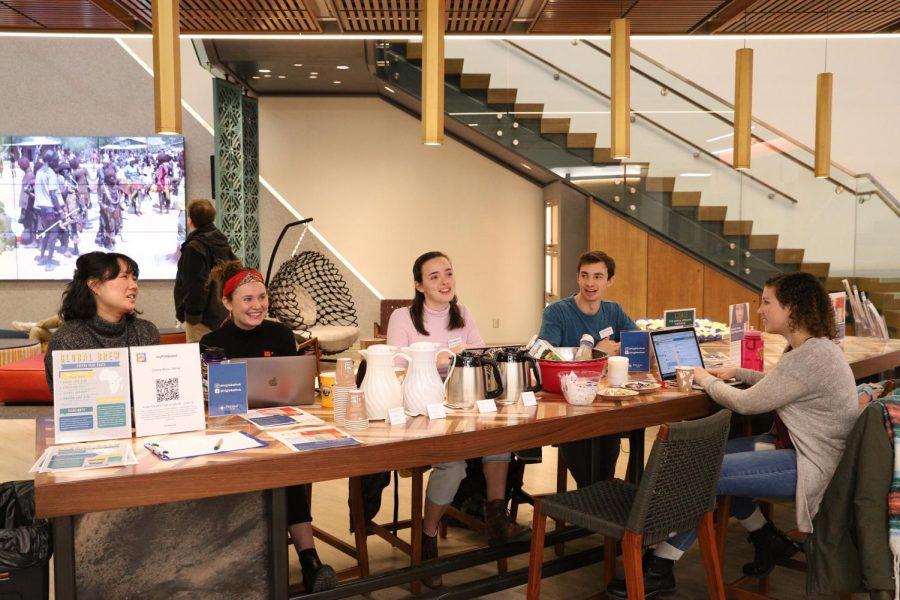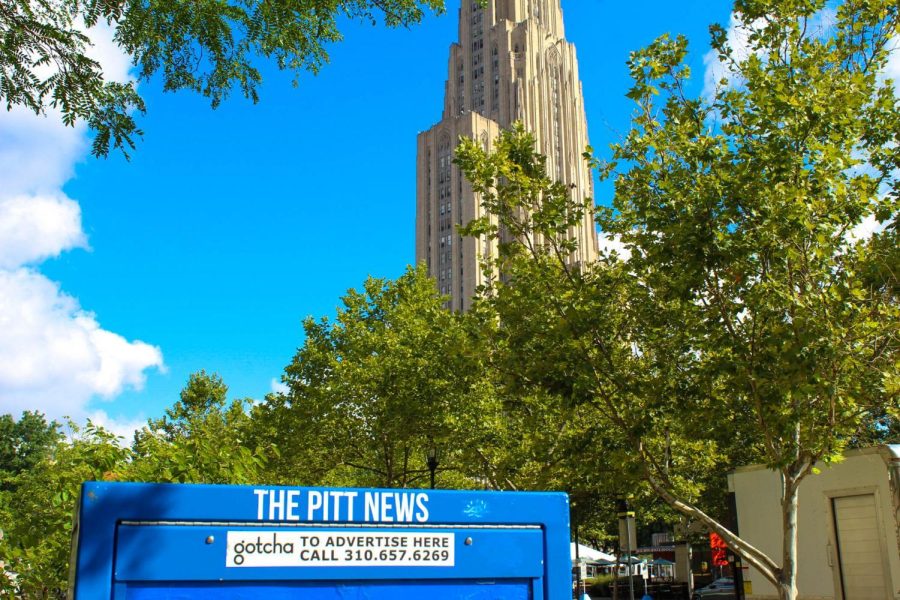Global Brew connects Pitt students with coffee from all over the world
Kaycee Orwig | Senior Staff Photographer
Global Brew, hosted in Posvar Hall’s Global Hub, aims to educate people on the details of the worldwide coffee industry and its economic implications and consequences for both producers and consumers.
March 5, 2020
The scent of freshly brewed coffee enticed curious students to sample four different African brews at a small table in the at the Global Hub in Posvar Hall on Friday.
To educate students about the coffee industry, the Global Hub featured its third coffee-tasting event in an ongoing series, called Global Brew, from 9:30 a.m. to noon. Each Global Brew event features coffee produced on a different continent — for the third installment, the Hub chose coffee produced in Africa.
According to the event website, Global Brew aims to educate people on the details of the worldwide coffee industry and its economic implications and consequences for both producers and consumers. Global Hub ambassador Meghan Dillon, a senior environmental science major, said Global Brew is a way for students to learn more information about the coffee industry through the drink itself in a relaxed environment.
“It’s a good way to start a conversation about a different place and someone can learn something new in a fun, low-key, laid-back way,” Dillon said.
For the latest in these conversations, the team at the Global Hub chose to feature Africa because of the region’s major significance in the industry as a producer of many different kinds of coffee, according to Karen Lue, the manager of the Global Hub. They also coordinated the event to coincide with Black History Month. Lue said that about 25 people have attended each event so far, including the one on Friday.
The coffee beans served at the event were grown and produced in four Eastern and Central African countries — Ethiopia, Rwanda, Uganda and the Democratic Republic of the Congo. All four types of coffee were freshly brewed, poured from carafes, labeled with their respective names and served with cream and sugar on the side for those who wanted a hint of sweetness. At any Global Brew event, anyone walking by the Hub on their way to class is welcome to stop by for some free coffee and knowledge provided by the Global Hub ambassadors and fliers handed out at the events.
According to one such flyer, one coffee at the event, the Ethiopian Gugi, is produced on a fair trade, family-owned farm in Ethiopia. The farm directly exports its beans, which allows it to have total control over planting, harvesting and exporting its product and having control over its business. Additionally, Ethiopia is one of the top 10 coffee producing countries in the world because the most commonly consumed coffee worldwide, Arabica coffee, was first cultivated in Ethiopian soil.
The flyer provided more information about another featured coffee, the fair trade certified Uganda Bukonzo. The beans are grown by the Bukonzo Joint Cooperative, a group of more than 5,000 farmers that adheres to the Gender Action Learning Systems methodology. This system ensures equal participation of both men and women in the coffee production chain, and because of this, nearly 98% of the cooperative is made up of women.
Not only is the coffee sourced from specific African regions, according to Lue, but it was also purchased locally. She said all four types of coffee beans were purchased here in Pittsburgh, then ground and brewed at the Hub.
“I typically get all of the beans in the Strip District at the Allegheny Coffee Company because they have a really wide variety,” she said. “I’m also in charge of setting everything up and getting everything ground.”
Previous Global Brew events this semester featured coffee from Latin America and from Asia. According to Salena Ringenbach, a Global Hub ambassador who attended the event, the Hub always provides informational flyers that provide detailed information about the coffees and the regions in which they are cultivated.
“It’s a great opportunity for us to connect with students, especially because everyone wants coffee,” she said. “When they come for a cup we have flyers with some facts about where the coffee is coming from to promote awareness of where your products are from, what different countries export, and what we import from them.”
In the future, Lue said the Global Hub plans on having more Global Brew events focusing on Latin America and Asia, as well as expanding to events that focus on tea as well.
“Asia, Africa and Latin America are the biggest producers of coffee so we’ll probably have to cycle through those regions again,” she said. “So far we’ve only done coffee, but in the future we’re hoping to do tea, as well — that way, we could feature different tea leaves that are produced in different places.”
According to Dillon, one reason the organizers wanted to educate students about coffee is a heightened awareness of climate change. Dillion said people should be especially conscious of their coffee intake because even coffee habits have an impact on the global environmental future.
“I think, especially in the future, that a lot of the main regions where coffee is grown are going to be impacted by climate change,” Dillon said. “It’s very important to think about where [coffee is] coming from and how it’s affecting the lives and environments of the people there.”
Dillon stressed the importance of being knowledgeable about the coffee industry whenever we enjoy our daily mug.
“It’s important to know about the producer’s wages and also about fair trade,” she said. “It’s so easy to just sip on your coffee and not think about it.”








